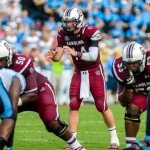A few days ago, everyone in college football was counting down the minutes until the dismissal of Johnny Manziel after he reportedly took money for some autographs he signed for a broker. But today, after a nationwide search on Google for collegiate merchandise and new allegations of multiple players taking money for signed memorabilia, the NCAA needs to begin preparation to close its doors once and for all, as it can no longer manage the business that is college athletics.
Let’s clear a few things up first.
Firstly, college athletes do get compensated. The average cost for one year of education across the board is $33,775. So in four years, that would equal $131,100 for a first-rate education that will benefit each athlete. This does not includ the travel money, meals and other benefits that student-athletes have over the average college student. Over a lifetime, a high school graduate will earn around $1 million, while a college graduate will earn around $2.5 million. So to say a college athlete is not compensated is wrong.
But is it a fair amount based on the revenue that the university is making on their talents and abilities? No.
The average television payout for each school that is a member of the five major BCS conferences is around $20 million per year, based on data from 2012. If you divide that by 200 players that help get the team ready to play and win games each week, that is around $100,000 per athlete one could argue they deserve. But factor in the cost of classes, travel, food and medical care, I’m pretty sure that number would work out to be an easy $100,000 per athlete. So let’s say its a wash.
Now add to the debate the storm that Jay Bilas started yesterday as he led the social media world into an analysis of how the NCAA uses the names of the players in search protocols to benefit in selling merchandise, along with the Jadeveon Clowney autographs, and the matter just got real complicated.
But here is a news flash, folks.
This is something that has been going on for decades, and it is a practice that will never cease to exist as long as the NCAA is the watchdog of college athletics. The Collegiate Licensing Company is the expert in the field of University property and should be in control of this because they are much more equipped legally to handle the brand of amateur athletes.
In fact, here is how you solve this whole debate.
First, each player who signs an athletic scholarship (whether it is women’s soccer or college football) also signs with CLC to work as their branding consultant during their collegiate career. Right off the bat, it creates a relationship with the university and the athletes so they can track their marketability and earnings from an unbiased and equal audit. Any money created beyond what it costs the student-athlete to earn their degree will be paid out once they have graduated or they leave for a professional career. Basically, it’s a savings account for these students.
Second, since every athlete is bound by the same marketing agreement within their scholarship, this will allow CLC to police all agent and booster activity. Since they have signed the contract for exclusive amateur rights with CLC, if an athlete accepts anything from anyone else, it makes their contract null and void. The punishment is tied directly to the athlete and coach and not to the team as a whole. The athlete is judged accordingly at that time.
In the span of 10 minutes, this has solved everything, right?
It is clear that the days of the NCAA are numbered. Their management tactics are from an era that has passed the world by year ago. They cannot continue to market players, generate revenue, and then investigate and suspend a player who has his preacher by him dinner at McDonalds after Bible study.
It’s shady and an unethical business practice, not to mention the fact is in direct violation of its own rules created to protect the amateurism of the student-athlete.
Good riddance, NCAA. No one needs you anymore to figure out what’s best for our kids and the sports we love.
M Shannon Smallwood is a member of the Football Writers Association of America and the US Basketball Writers Association.
Follow him @woodysmalls.




















